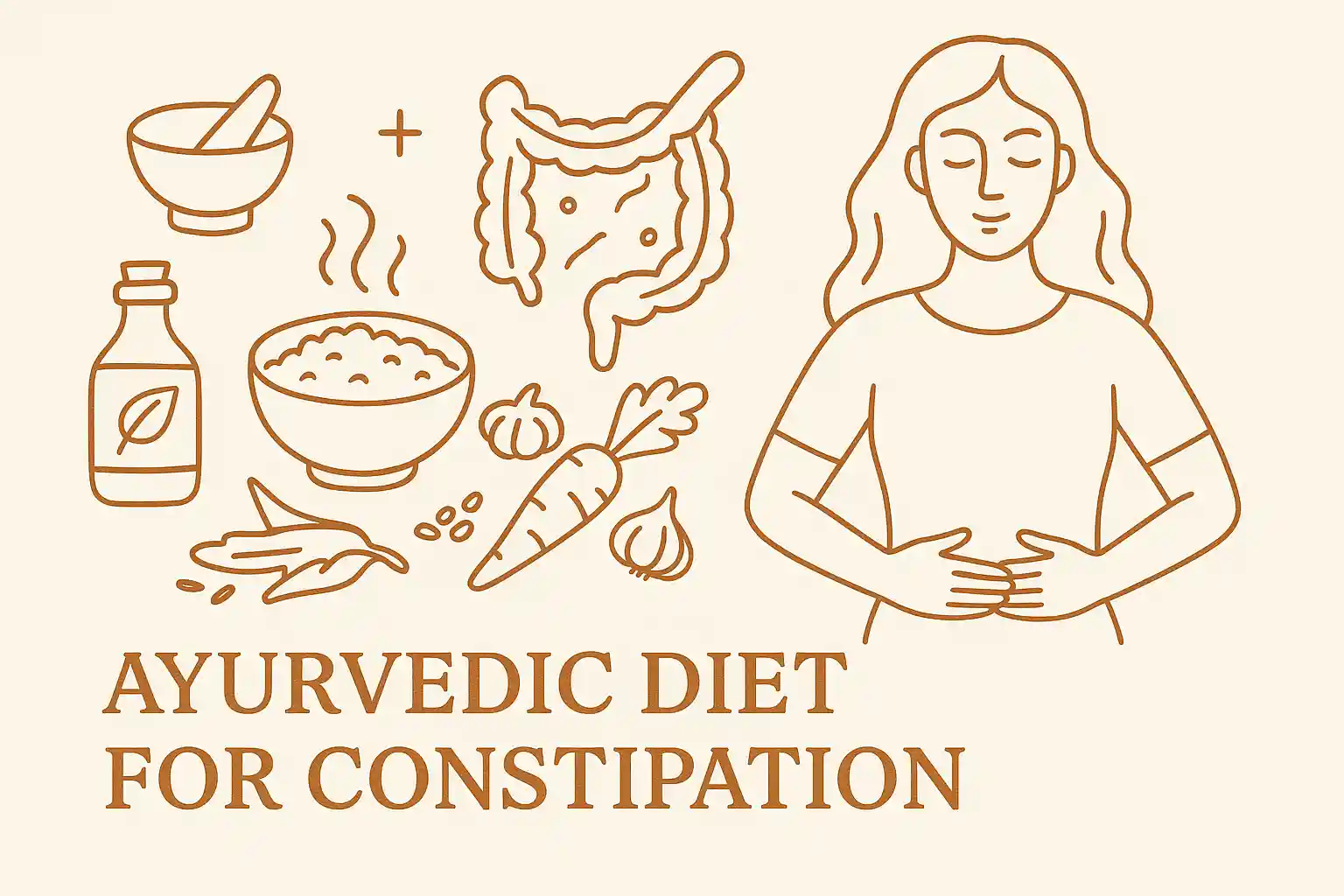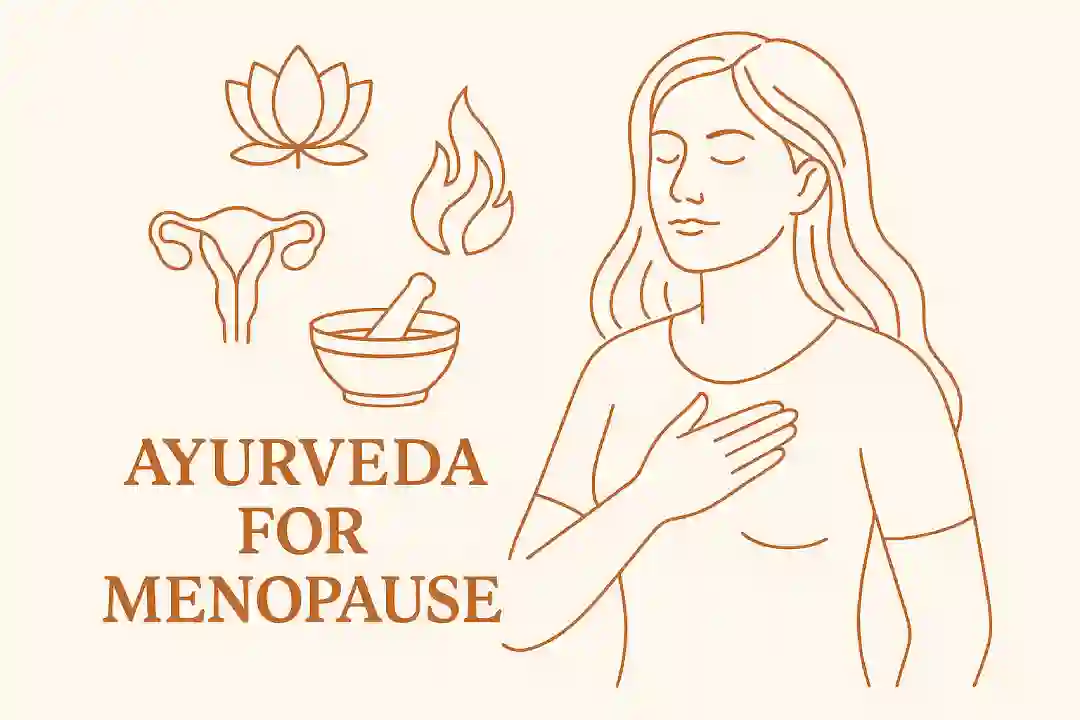Struggling to fall asleep or stay asleep? Ayurveda—a time-tested health system from India—offers a simple food-first approach: calm the nervous system, warm and nourish the body, and avoid stimulants at night. You don't need to "know" Ayurveda to try this. Think of it as bedtime nutrition that's gentle, comforting, and surprisingly effective.
The 3 Rules Before Food
Timing
Eat your evening meal 2–3 hours before bed. A light, warm dinner is easiest to digest.
Temperature
Favor warm over cold; warmth signals safety and helps relax tense, "wired" energy.
Taste & Texture
Choose foods that are naturally sweet, creamy, and unctuous (a little ghee or healthy fat).
Pantry Targets (with US–India swaps)
| Category | Best Choices | Notes |
|---|---|---|
| Dairy | Whole cow's milk (US: organic/grass-fed; India: desi/A2) | Use warm almond or oat milk if dairy doesn't agree |
| Grains | Rice (sona masoori, basmati, short-grain), oats | Old-fashioned or steel-cut oats preferred |
| Legumes | Split yellow moong dal | Light, soothing protein ideal for dinner |
| Fats | Ghee for cooking/finishing | US: cultured ghee; India: homemade/trusted brand |
| Fruits | Ripe banana, dates, stewed apple or pear | Cooked fruits better than raw at night |
| Spices | Cardamom, cinnamon, nutmeg, saffron, fennel - see our complete guide to sleep-promoting spices | Nutmeg is potent—use sparingly |
| Nuts & Seeds | Almonds (soaked & peeled), poppy seeds, pumpkin seeds | Pumpkin seeds offer magnesium for relaxation |
What to Skip at Night (Most Common Sleep Saboteurs)
Avoid These
- ☒ Caffeine after early afternoon
- ☒ Very spicy, deep-fried foods
- ☒ Ice-cold smoothies & raw salads
- ☒ Sugar spikes & alcohol
- ☒ Heavy meat dinners
Choose Instead
- ☑ Herbal teas and warm milk
- ☑ Gently spiced, easy-to-digest foods
- ☑ Warm, cooked meals
- ☑ Natural sweeteners in moderation
- ☑ Light proteins like moong dal
Five Bedtime Recipes that Actually Help
All quantities serve 1. Adjust to taste, but keep it light.
Why it helps: Warm, lightly sweet, aromatic; the tiny nutmeg pinch can feel sedative for some.
Ingredients:
- 1 cup milk (dairy or almond)
- 2–3 cracked cardamom pods (or ¼ tsp ground)
- Pinch nutmeg (⅛ tsp or less)
- 1–2 strands saffron (optional)
- ½–1 tsp jaggery or maple syrup
Method:
Simmer milk with cardamom and saffron 5 minutes. Cool a minute; whisk in jaggery and nutmeg. Sip slowly.
Why it helps: Creamy, grounding; poppy seed is a traditional night-time ingredient in many Indian households.
Ingredients:
- 1 cup milk (dairy or oat)
- 1 tbsp finely ground poppy seeds (or 1 tsp if sensitive)
- 6 soaked, peeled almonds, crushed
- ¼ tsp cardamom, pinch cinnamon
- 1 tsp jaggery (optional)
Method:
Simmer milk with poppy, almonds, and spices 3–4 minutes, whisking. Sweeten lightly.
Sub: If poppy seeds are unavailable, use pumpkin seeds (ground) for a gentler, magnesium-rich option.
Why it helps: Light one-pot meal that calms and digests well, reducing late-night tossing. Perfect for those with Vata imbalances that affect sleep.
Ingredients:
- ¼ cup split yellow moong dal (rinsed)
- ¼ cup rice (rinsed)
- 1 tsp ghee
- ½ tsp cumin seeds, pinch hing (asafoetida)
- ½ tsp grated ginger (optional, mild)
- 2½ cups water, salt to taste
Method:
Warm ghee, bloom cumin/hing, add dal/rice/ginger, stir 1 minute. Add water, salt; simmer 25–30 minutes until soft/porridgy.
Make it sleep-friendly: Keep spices gentle; finish with ½ tsp ghee and fennel to reduce heaviness.
Why it helps: Soft, lightly sweet, easy on digestion; excellent for those who crave dessert.
Ingredients:
- 1 medium ripe apple, peeled and diced
- ½ cup water
- ½–1 tsp ghee
- ¼ tsp cardamom, pinch cinnamon
Method:
Simmer apple and water until soft. Stir in ghee and spices. Serve warm.
US tip: Use pears in winter; India: add a few raisins if desired.
Why it helps: Oats are warming and satisfy a "need something" feeling without spiking blood sugar if kept modest.
Ingredients:
- ½ cup old-fashioned oats
- 1 cup water + ½ cup milk (or all milk)
- 1 tsp ghee, ¼ tsp cardamom
- 1 chopped date or ½ small ripe banana
Method:
Cook oats to creamy; stir in ghee, cardamom, and fruit. Keep the portion small.
Optional Bedtime Beverages (Non-Dairy)
Fennel-Licorice Warm Infusion
Steep ½ tsp fennel seeds + ¼ tsp licorice root in hot water 6–8 minutes; strain. Sweet, soothing.
Cinnamon–Cardamom Almond Milk
Simmer 1 cup almond milk with ¼ tsp cinnamon, a pinch cardamom. No caffeine, gently aromatic.
Personalize by Tendency (Even if You Don't "Know Your Dosha")
Wired & Anxious
(Often Vata Imbalance)If you feel: Racing mind, cold, restless
Lean into: Warm milk, ghee, rice porridge, khichdi, bananas, dates, gentle spices (cardamom, cinnamon, fennel)
Learn more about managing anxiety through Ayurveda.
Hot & Irritable
(Often Pitta Imbalance)If you: Run hot, wake at 2–3 a.m., feel irritable
Try: Light dinner, stewed apple/pear, oat kheer with cardamom, saffron in milk. Avoid chili and alcohol late.
Heavy & Groggy
(Often Kapha Imbalance)If you feel: Heavy or groggy in the morning
Try: Early, light dinner (khichdi or soup). Smaller portions of milk drinks; emphasize fennel and mild ginger for digestion.
A 7-Night Bedtime Food Plan
(Rotate; Don't Overdo)
| Day | Dinner | Bedtime Drink/Snack |
|---|---|---|
| Monday | Khichdi dinner | Moon Milk 45 minutes pre-bed |
| Tuesday | Soup-style moong dal + rice | Stewed Apple dessert |
| Wednesday | Early dinner | Almond–Poppy Kheerlette at 9 p.m. if hungry |
| Thursday | Vegetable upma or poha (mild) | Fennel-Licorice infusion |
| Friday | Khichdi (add carrots/zucchini) | Cinnamon–Cardamom Almond Milk |
| Saturday | Oat "Kheer" bowl | Quiet evening, screens off early |
| Sunday | Simple rice porridge with ghee | Moon Milk (nutmeg micro-pinch) |
Evidence-Mindset without Hype
Ayurveda emphasizes direct experience: notice how you actually sleep after a warm, simple evening routine. Many people find that a lighter dinner, plus a small, warm, spiced bedtime drink, settles the body and mind. Keep portions small; the goal is comfort, not a second meal.
Safety, Allergies & Common-Sense Notes
Important Notes
- Dairy sensitivity: Choose almond or oat milk; add ½ tsp ghee only if tolerated
- Nutmeg: Use a pinch—it's potent
- Poppy seeds: Traditional night ingredient; check local laws/availability
- Licorice root: Avoid with uncontrolled hypertension
When to Seek Help
Chronic insomnia, snoring, or sleep apnea: Food helps, but consult a clinician to rule out medical causes. Persistent digestive issues affecting sleep may benefit from understanding Ama (toxins) in Ayurveda.
How to Make This Work in Real Life
Consistency
Pick one night drink you genuinely enjoy; repeat it 4–5 nights. Consistency beats novelty.
Prep Smart
Batch-prep khichdi staples (rinsed moong + rice) so dinner is easy.
Set Boundaries
Set a "kitchen closed" time. Aim for 6:30–8:00 p.m. dinners.
Create Ritual
Pair with wind-down: dim lights, warm shower, light stretching, phone on airplane mode. Create a complete Ayurvedic evening routine that supports your morning routine for balanced daily rhythms.
For those dealing with sleep issues related to stress and anxiety, explore our guide on Ayurvedic approaches to anxiety. Women experiencing sleep disturbances during menopause can find specific guidance in our Ayurvedic nutrition for menopause guide. If digestive discomfort is affecting your sleep, learn about Ayurvedic solutions for digestive health.
Frequently Asked Questions: Ayurvedic Sleep Nutrition
Related Articles

Ayurvedic Diet for Constipation: Foods, Herbs, and Practices to Restore Regularity
Ease constipation naturally with Ayurvedic foods, herbs, and Vata-balancing practices. Support digestion and restore regularity gently and holistically.
min read
Ayurvedic Food for Menopause: Nourishing Your Transition Naturally
Discover how Ayurvedic nutrition can support your menopause journey naturally. Learn about Vata-balancing foods, hormone-supporting herbs, and nourishing meals to ease transition symptoms.
8 min read min read